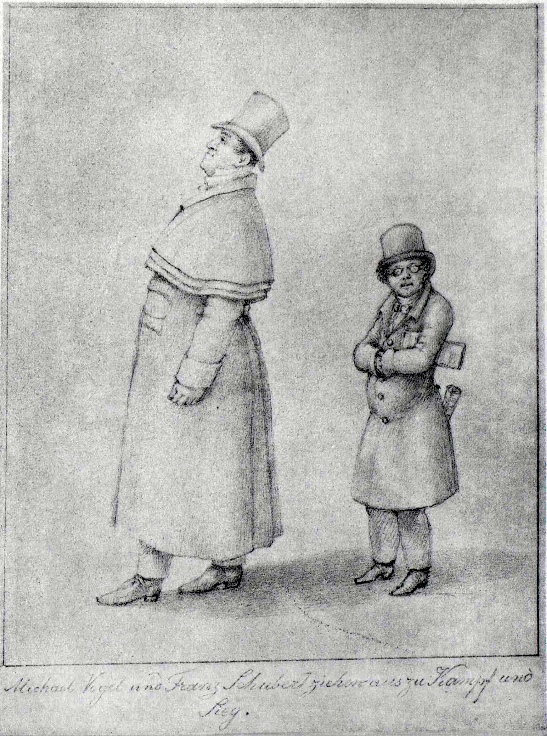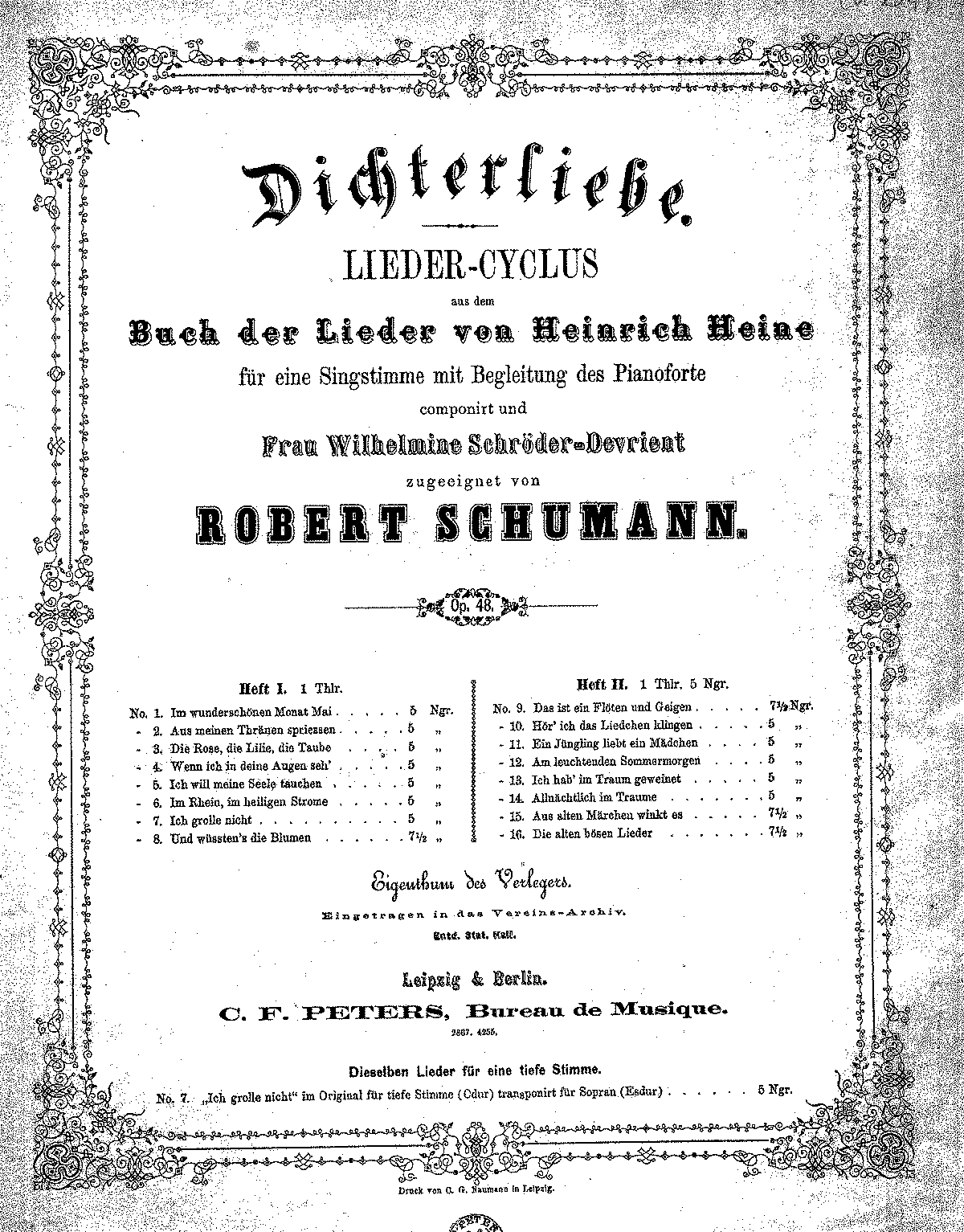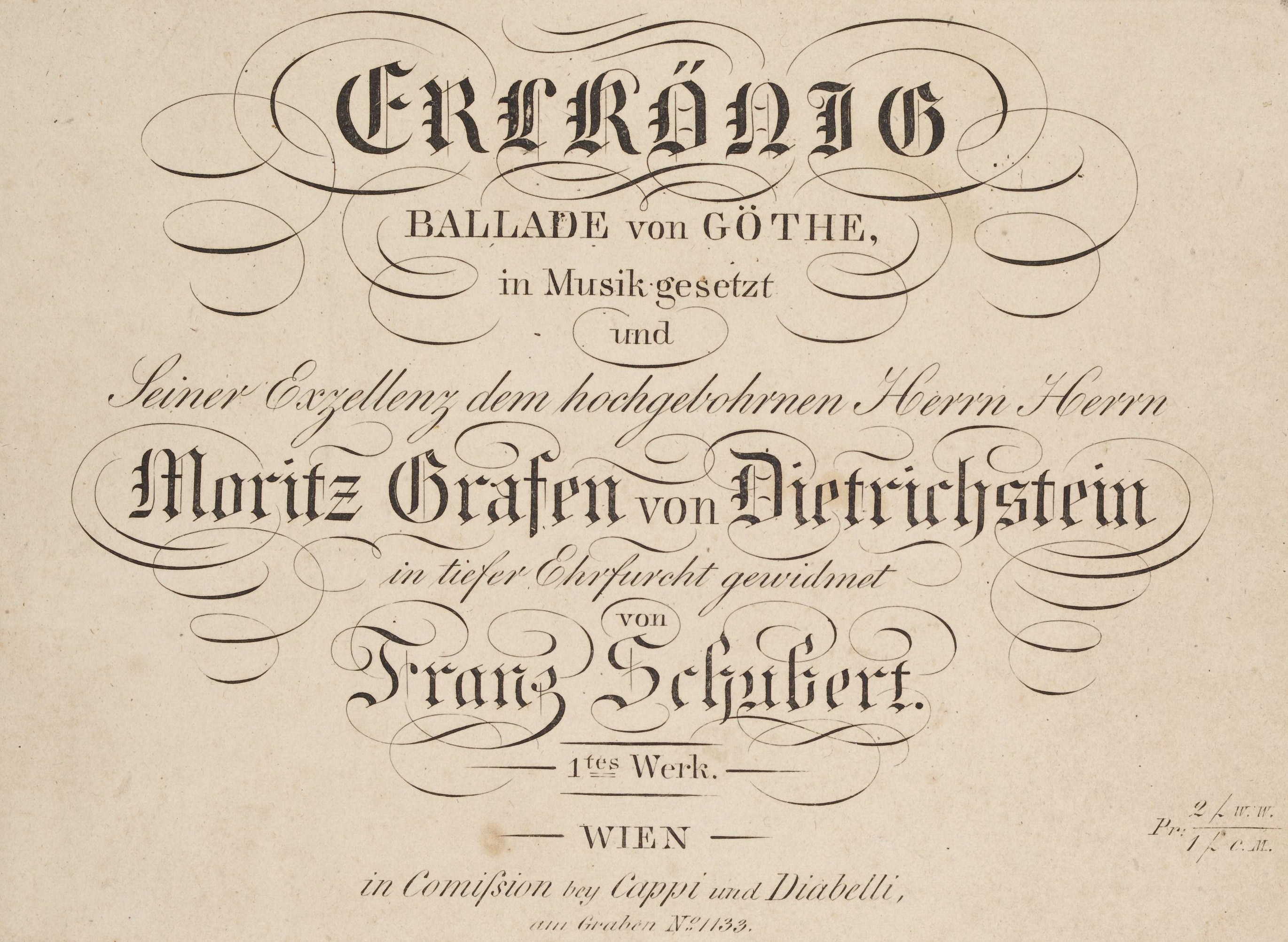|
Swan Song (Schubert)
''Schwanengesang'' (Swan Song), 957, is a collection of 14 songs written by Franz Schubert at the end of his life and published posthumously: # Liebesbotschaft (text: Ludwig Rellstab) # Kriegers Ahnung (Rellstab) # Frühlingssehnsucht (Rellstab) # Ständchen (Rellstab) # Aufenthalt (Rellstab) # In der Ferne (Rellstab) # Abschied (Rellstab) # Der Atlas (Heinrich Heine) # Ihr Bild (Heine) # Das Fischermädchen (Heine) # Die Stadt (Heine) # Am Meer (Heine) # Der Doppelgänger (Heine) # Die Taubenpost (alternative: D 965a) (Johann Gabriel Seidl) The autograph manuscript of the collection is preserved in the Morgan Library & Museum. Background Named by its first publisher, Tobias Haslinger, who presumably wished to present it as Schubert's last testament, ''Schwanengesang'' differs from the earlier ''Die schöne Müllerin'' and ''Winterreise'' song-cycles by including settings of more than one poet. Seven texts by Ludwig Rellstab (1799–1860) are followed by six by Heinrich Heine ... [...More Info...] [...Related Items...] OR: [Wikipedia] [Google] [Baidu] |
Schubert Schwanengesang Bd
Franz Peter Schubert (; ; 31 January 179719 November 1828) was an Austrian composer of the late Classical period (music), Classical and early Romantic music, Romantic eras. Despite his short life, Schubert left behind a List of compositions by Franz Schubert, vast ''oeuvre'', including more than 600 ''Lieder'' (art songs in German) and other vocal works, seven complete symphonies, sacred music, operas, incidental music, and a large body of piano and chamber music. His major works include "Erlkönig (Schubert), Erlkönig", "Gretchen am Spinnrade", and "Ave Maria (Schubert), Ave Maria"; the Trout Quintet, ''Trout'' Quintet; the Symphony No. 8 (Schubert), Symphony No. 8 in B minor (''Unfinished''); the Symphony No. 9 (Schubert), Symphony No. 9 in C major (''Great''); the String Quartet No. 14 (Schubert), String Quartet No. 14 in D minor (''Death and the Maiden''); the String Quintet (Schubert), String Quintet in C major; the Impromptus (Schubert), Impromptus for solo piano; the S ... [...More Info...] [...Related Items...] OR: [Wikipedia] [Google] [Baidu] |
Carlo Sabajno
Carlo Sabajno (1874 in Rosasco, Italy – 1938 in Milan) was an Italian conductor. From 1904 to 1932, he was the Gramophone Company's chief conductor and artistic director in Italy, responsible for some of the earliest full-length opera recordings, most of them with the orchestra of La Scala, Milan and prominent singers there. Particularly outstanding among these are his stately, authoritative late-1920s and early-1930s electrical recordings of Don Pasquale (with Tito Schipa in his only complete opera recording as Ernesto), Traviata (sadly limited by more than the usual cuts, but with silvery-voiced Alessandro Ziliani as Alfredo), Aida (with Irene Minghini-Cattaneo's Amneris and Aureliano Pertile's Radamès), Otello (with Apollo Granforte as a formidable Iago) and Bohème (a superb understated, but highly distinguished, collaboration with excellent, if lesser-known, singers). Discography 1907 *1907 Leoncavallo: ''Pagliacci'' – Antonio Paoli, Giuseppina Huguet, Ernesto ... [...More Info...] [...Related Items...] OR: [Wikipedia] [Google] [Baidu] |
Musical Settings Of Poems By Heinrich Heine , the ability to perceive music or to create music
*
{{Music disambiguation ...
Musical is the adjective of music. Musical may also refer to: * Musical theatre, a performance art that combines songs, spoken dialogue, acting and dance * Musical film and television, a genre of film and television that incorporates into the narrative songs sung by the characters * MusicAL, an Albanian television channel * Musical isomorphism, the canonical isomorphism between the tangent and cotangent bundles See also * Lists of musicals * Music (other) * Musica (other) * Musicality Musicality (''music -al -ity'') is "sensitivity to, knowledge of, or talent for music" or "the quality or state of being musical", and is used to refer to specific if vaguely defined qualities in pieces and/or genres of music, such as melodiousnes ... [...More Info...] [...Related Items...] OR: [Wikipedia] [Google] [Baidu] |
Compositions By Franz Schubert Published Posthumously
Composition or Compositions may refer to: Arts and literature *Composition (dance), practice and teaching of choreography *Composition (language), in literature and rhetoric, producing a work in spoken tradition and written discourse, to include visuals and digital space *Composition (visual arts), the plan, placement or arrangement of the elements of art in a work * ''Composition'' (Peeters), a 1921 painting by Jozef Peeters *Composition studies, the professional field of writing instruction * ''Compositions'' (album), an album by Anita Baker *Digital compositing, the practice of digitally piecing together a still image or video *Musical composition, an original piece of music, or the process of creating a new piece Computer science *Compose key, a key on a computer keyboard *Compositing window manager a component of a computer's graphical user interface that draws windows and/or their borders *Function composition (computer science), an act or mechanism to combine simple functi ... [...More Info...] [...Related Items...] OR: [Wikipedia] [Google] [Baidu] |
Lieder Composed By Franz Schubert
In the Western classical music tradition, ( , ; , ; ) is a term for setting poetry to classical music. The term is used for any kind of song in contemporary German and Dutch, but among English and French speakers, is often used interchangeably with "art song" to encompass works that the tradition has inspired in other languages as well. The poems that have been made into lieder often center on pastoral themes or themes of romantic love. The earliest ''Lieder'' date from the late fourteenth or early fifteenth centuries, and can even refer to from as early as the 12th and 13th centuries. It later came especially to refer to settings of Romantic poetry during the late eighteenth and nineteenth centuries, and into the early twentieth century. Examples include settings by Joseph Haydn, Wolfgang Amadeus Mozart, Ludwig van Beethoven, Franz Schubert, Robert Schumann, Johannes Brahms, Hugo Wolf, Gustav Mahler or Richard Strauss. History Terminology For German speakers, the te ... [...More Info...] [...Related Items...] OR: [Wikipedia] [Google] [Baidu] |
Isabella Stewart Gardner Museum
The Isabella Stewart Gardner Museum is an art museum in Boston, Massachusetts, which houses significant examples of European, Asian, and American art. Its collection includes paintings, sculpture, tapestries, and decorative arts. It was founded by Isabella Stewart Gardner, whose will called for her art collection to be permanently exhibited "for the education and enjoyment of the public forever." The museum opened in 1903. An auxiliary wing designed by Italian architect Renzo Piano, adjacent to the original structure near the Back Bay Fens, was completed in 2012. In 1990, thirteen of the museum's works were stolen; the crime remains unsolved, and the works, valued at an estimated $500 million, have not been recovered. History The museum was built in 1898–1901 by Isabella Stewart Gardner (1840–1924), an American art collector, philanthropist, and patron of the arts in the style of a 15th-century Venetian palace. It opened to the public in 1903. Gardner began collect ... [...More Info...] [...Related Items...] OR: [Wikipedia] [Google] [Baidu] |
List Of Compositions By Franz Schubert
Franz Schubert (31 January 1797 – 19 November 1828), a Viennese composer of the late Classical to early Romantic eras, left a very extensive body of work notwithstanding his short life. He wrote over 1,500 items, or, when collections, cycles and variants are grouped, some thousand compositions. The largest group are his over six hundred Lieder for solo voice and piano. He composed nearly as many piano pieces, and further some 150 part songs, some 40 liturgical compositions (including several masses) and around 20 stage works like operas and incidental music. His orchestral output includes thirteen symphonies (seven completed) and several overtures. Schubert's chamber music includes over 20 string quartets, and several quintets, trios and duos. Otto Erich Deutsch compiled the first comprehensive catalogue of Schubert's works and published it in 1951 as '' Schubert: Thematic Catalogue of all his Works in Chronological Order''. A revised edition appeared in German in 1978 ... [...More Info...] [...Related Items...] OR: [Wikipedia] [Google] [Baidu] |
List Of Songs By Franz Schubert
The following is a list of the complete secular vocal output composed by Franz Schubert (31 January 1797 – 19 November 1828). It is divided into eleven sections, and attempts to reflect the most current information with regards to Schubert's catalogue. The works contained in this list refer to those found primarily in the following two series of the New Schubert Edition (NSE) edition: * Series III: Partsongs, Choruses and Cantatas (Mehrstimmige Gesänge) * Series IV: Songs for solo voice (Lieder) Note however that some of Schubert's song cycles contain both Lieder and part songs. The list below includes the following information: * D – the catalogue number assigned by Otto Erich Deutsch or NSE authorities * Genre – the musical genre to which the piece belongs * Title – the title of the work * Incipit – the first line(s) of text, as pertaining to vocal works * Scoring – the instrumentation and/or vocal forces required for the work * Informal Title – any additional ... [...More Info...] [...Related Items...] OR: [Wikipedia] [Google] [Baidu] |
Franz Liszt
Franz Liszt (22 October 1811 – 31 July 1886) was a Hungarian composer, virtuoso pianist, conductor and teacher of the Romantic music, Romantic period. With a diverse List of compositions by Franz Liszt, body of work spanning more than six decades, he is considered to be one of the most prolific and influential composers of his era, and his piano works continue to be widely performed and recorded. Liszt achieved success as a concert pianist from an early age, and received lessons from the esteemed musicians Carl Czerny and Antonio Salieri. He gained further renown for his performances during tours of Europe in the 1830s and 1840s, developing a reputation for technical brilliance as well as physical attractiveness. In a phenomenon dubbed "Lisztomania", he rose to a degree of stardom and popularity among the public not experienced by the virtuosos who preceded him. During this period and into his later life, Liszt was a friend, musical promoter and benefactor to many composer ... [...More Info...] [...Related Items...] OR: [Wikipedia] [Google] [Baidu] |
Johann Senn
Johann Chrysostomus Senn (1 April 1795, Pfunds – 30 September 1857, Innsbruck; pseudonym: ''Bombastus Bebederwa'') was a political lyric poet of the Vormärz. Life Johann Senn was the son of the freedom fighter, Franz Michael Senn. He lived in Vienna from 1807 and attended the Akademische Gymnasium. He was a pupil of the Wiener Stadtkonvikt along with Franz Schubert. He later studied philosophy, law und medicine, none of which he managed to complete. He became a teacher to Baron Anton von Doblhoff-Dier. From 1815, his interest in politics grew ever more strident. Members of his circle included his old schoolmate, the composer Franz Schubert, the poet Johann Mayrhofer, the lawyer and later ''Redemptorist'' Franz von Bruchmann, the artist Leopold Kupelwieser and the doctor Ernst von Feuchtersleben. In 1820, Senn was arrested because of rude behavior during a police visit and imprisoned for almost a year. He was then deported to County of Tyrol, Tyrol and never returned to Vien ... [...More Info...] [...Related Items...] OR: [Wikipedia] [Google] [Baidu] |
Atlas (mythology)
In Greek mythology, Atlas (; , ''Átlās'') is a Titans, Titan condemned to hold up the heavens or sky for eternity after the Titanomachy. Atlas also plays a role in the myths of two of the greatest Hero#Antiquity, Greek heroes: Heracles (Hercules in Roman mythology) and Perseus. According to the ancient Greek poet Hesiod, Atlas stood at the ends of the earth in the extreme Hesperides, west. Later, he became commonly identified with the Atlas Mountains in northwest Africa and was said to be the first King of Mauretania (modern-day Morocco and west Algeria, not to be confused with the modern-day country of Mauritania). Atlas was said to have been skilled in philosophy, mathematics, and astronomy. In antiquity, he was credited with inventing the first celestial spheres, celestial sphere. In some texts, he is even credited with the invention of astronomy itself. Atlas was the son of the Titan Iapetus and the Oceanids, Oceanid Asia (Oceanid), Asia or Clymene (wife of Iapetus), Clym ... [...More Info...] [...Related Items...] OR: [Wikipedia] [Google] [Baidu] |
Maksym Rylsky
Maksym Tadeyovych Rylsky (); in Kyiv – 24 July 1964 in Kyiv) was a Ukrainian poet, translator, academician, and doctor of philological sciences. Biography Rylsky was born in Kyiv in 1895 to Tadei Rozeslavovych Rylsky and Melania Fedorivna. His father was a public activist, ethnographer, publicist, and member of the Kyiv Stara Hromada (Old Community), while his mother was a peasant from the village of Romanivka, Zhytomyr Oblast. Rylsky received his early education at home and attended school beginning in third grade at the Kyiv Private Gymnasium of Volodymyr Naumenko in 1908. During his time in gymnasium, Rylsky became friends with the families of Mykola Lysenko and Oleksandr Rusov. From 1915 to 1917, he studied at the medical faculty of Kyiv University. When the Ukrainian People's University was established in October 1917, Rylsky transferred to its history and philology faculty. Due to the Ukrainian–Soviet War, Rylsky left Kyiv in late 1917. He and his brother Ivan ... [...More Info...] [...Related Items...] OR: [Wikipedia] [Google] [Baidu] |






